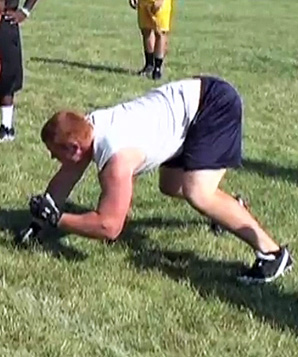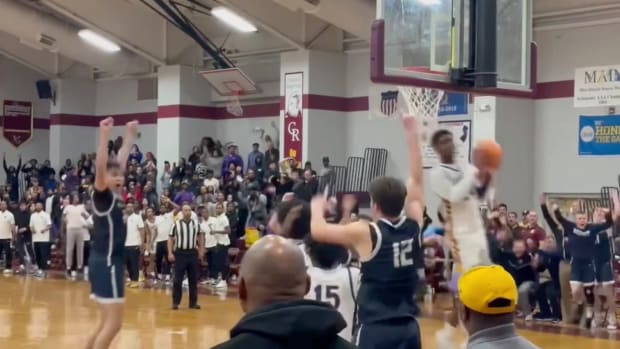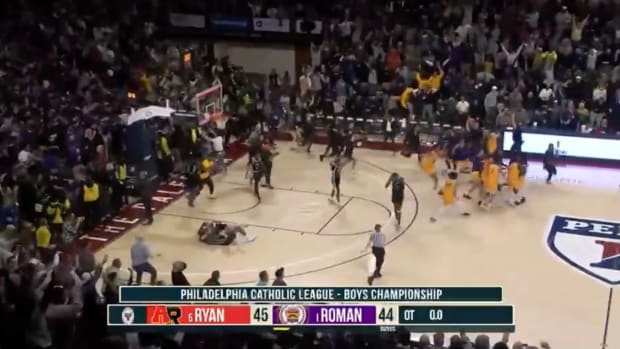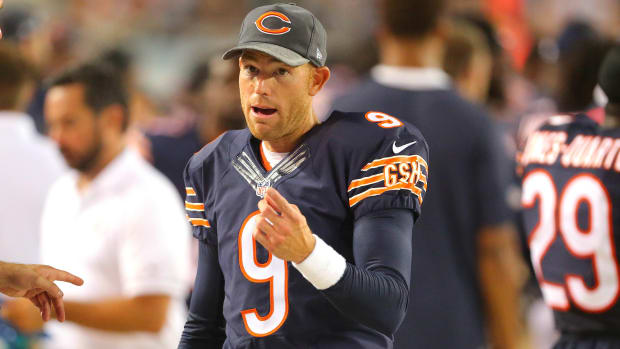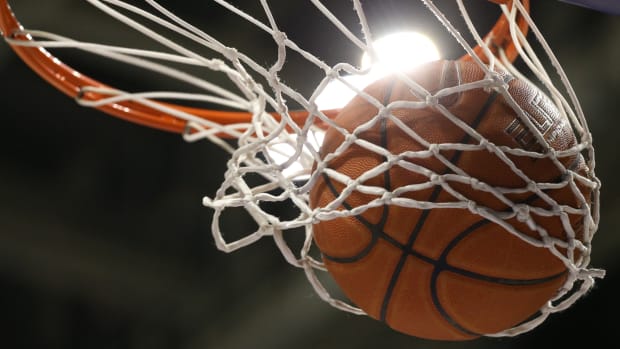Despite not playing any high school football, Uhl set to play college ball
Uhl was just missing one crucial thing: a high school football team.
Growing up in Memphis, Ind. (pop. 695), Uhl never played high school football. His tiny school of Henryville High (enrollment: 490) didn't have a program, and he gained most of his experience playing in a nearby community league, one that his parents helped run. Linda filmed the games, and Uhl's father, Jeff, called players who didn't show up. Griffin was forced to do things that most high schools players typically have done for them, from researching his own training methods to cooking his own meals.
Uhl dreamed of playing on Saturdays. But the odds were stacked staggeringly against him. According to the NCAA, of the 316,697 seniors that played high school football last year, just 6.1 percent will play at the next level.
"I got a lot of naysayers," Uhl said. "That just made me want to play more."
*****
College scouts weren't coming to Uhl's community league games, so he had to seek them out. The summer after his sophomore year, Uhl and his mother traveled to a scouting camp at Ball State.
When Uhl arrived, he didn't blend in with the other kids. He wasn't with a team -- he was all by himself. And then there was the issue of his equipment. He didn't have a Riddell Revolution helmet like other prospects; the other kids described his helmet as an antique.
Uhl soon realized that he was at a disadvantage. To compete, he would have to vastly overcompensate.
Of course, Uhl was well aware of that fact going in. In addition to lacking a program, Henryville's weight room was less than ideal ("The school weight room is basically a closet," he said), so Uhl had to learn to lift on his own. He frequented the local YMCA and drove more than a half an hour down Interstate 65 to train, gradually teaching himself to add weight, condition and follow a college-level regimen.
His dedication paid off. One spring day, Uhl participated in a light workout by himself. He squatted 585 pounds before a single drop of sweat rolled down the side of his face.
"I had to go and research and read stuff and learn about all that myself," Uhl said. "I think that's why I've gotten so much stronger than everybody else, because I had to learn how to do it myself."
That commitment bred success at Ball State's camp. Despite his old-fashioned helmet, Uhl emerged as a budding talent. He proved that he belonged.
"I get there and they're doing one-on-ones and I do really well," Uhl said, referring to blocking drills between offensive and defensive linemen. "At the end, they put me in a showcase rep, so it's like, all right, I can play against these guys that go to these big schools."
Linda still gets emotional when she thinks about that day. She called it the catalyst for a long, exhausting journey that would follow.
"We got in the car and he turned to me," Linda said, fighting back tears. "He said, 'Mom, now I know I can play with the kids that have had high school programs,' and that was kind of the moment where he knew -- he knew right then that he could do it."
*****
Uhl's training gave him strength, and the Ball State camp gave him confidence. But he still needed college coaches to notice him. The summer after his junior year, it began to happen.
He attended football camps at Louisville and the local-level National Underclassmen Combine. He was named defensive line MVP at the latter, and was invited to the Midwest Ultimate 100 Combine in Indianapolis. There, he went undefeated in one-on-one drills and was again labeled defensive line MVP. He was then invited to the Elite Top Prospect Camp in Norman, Okla.
Shortly after arriving, Linda and Griffin were approached by Dave Schuman, who founded National Underclassmen in 2005. He offered for Uhl to live with him in New Jersey and play his senior year on the high school team that he coached.
"He said, 'If he plays on my team he will get the exposure he needs and he'll have more D-I offers than he'll know what to do with'," Linda said.
Schuman was confident in Uhl's ability because of the things he heard from National Underclassmen coaches like Quincy Hipps. A former defensive end at Miami, Hipps noticed Uhl because of his high motor and accelerated learning curve.
"You know when you find something, a great player, because they could do things fast, they could do it the first time you show it to them," Hipps said. "He could pick it up as fast as you could put it down."
After drills, Hipps asked Uhl where he played in high school. He was shocked to find out the answer: he didn't.
"I had never in my life heard of that," Hipps said.
Despite the praise, Linda turned Schuman's offer down. It was too drastic of a move -- and too much for a mother to give up.
"I couldn't do that," Linda said. "I understood what the purpose was, but at the same time, we would be in a situation where -- if something would have really happened to him -- that wouldn't have been my decision anymore as to what was done to care for him. That was not something we were willing to do."
Schuman understood. But he made sure the Uhl family internalized one unmistakable fact. Although Griffin was in the top one percent of players that Schuman scouted, he only saw Uhl in shorts and a T-shirt, not pads and a uniform. While there was no denying his potential, there was no way of confirming it, either.
"Top one percent in shorts and T-shirts usually translates into being top one percent on the field," Schuman said. "But not always. That's the issue."
*****
Uhl played community league football again during his senior year, and Linda filmed every game. She pieced together the footage with film from camps and combines, and promptly sent it out to anyone who would accept it.
Without exception, every recipient said that Uhl was skilled enough to play at the next level. Linda recalled: "We kept hearing from everyone, 'He's Division-I material . . . No problem, just be patient, it's all going to happen. Send it out.'"
So she did. And the results were striking. According to Uhl, he was contacted by Wyoming, Indiana State, Illinois State, Western Kentucky, Murray State, Central Connecticut and Louisville. Unfortunately, since Uhl lacked any game experience, none were willing to offer him a scholarship.
National Signing Day came and went, and more than a month later, Uhl still didn't know where -- or if -- he was going play college football in the fall.
In fact, most of the schools that once expressed interest stopped contacting him altogether. Except Louisville.
Hipps played with Louisville's defensive line coach, Clint Hurtt, during his career at Miami. Hipps told his former teammate about Uhl, but Hurtt already had his eyes on the under-the-radar prospect. Hurtt recognized Uhl's potential during a Louisville camp the previous summer and continued to stay in touch with him.
Louisville couldn't offer him an athletic scholarship -- he didn't play high school football, after all -- but Hurtt was confident that if Uhl walked on, he would be able to earn one.
As the Uhls sat around the dinner table one night, Linda admitted she was warming to the idea. "If he walked on, it would be fitting because he didn't do anything else the conventional way," she said.
A week later, Griffin trekked to Louisville's campus to watch the Cardinals' spring practice. He obtained answers to his questions and went home to discuss his experience with his family. Two days later, he decided to join the Cardinals as a preferred walk-on.
Uhl didn't get there in any ordinary fashion. He didn't make local headlines, and he didn't make a ballyhooed Signing Day announcement. He didn't even have modern equipment. That basically says it all.
But somehow, someway, Uhl will play college football in 2012. Given the odds, that's a remarkable feat in itself.
At the local-level combine in Lexington, Ky., Linda remembers seeing a group of parents huddled around Je'Mone Smith, a former professional football player for the Philadelphia Eagles. She asked Smith for advice, for how to approach Uhl's unique high school situation.
Smith simply laughed. "Good luck," he said.
Now, after years of sweat and frustration, the Uhls are the ones laughing. Griffin is no longer telling people that he wants to play college football. He's telling them that he will.
